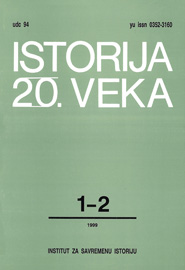SRBI U DRŽAVNOJ UPRAVI U SLAVONIJI ZA VREME PROVIZORIJUMA 1918-1921.
THE SERBS IN STATE ADMINISTRATION IN SLAVONIA DURING THE PROVISIONAL GOVERNMENT 1918-1921
Author(s): Đorđe StankovićSubject(s): Geography, Regional studies, Public Administration, Political history, Recent History (1900 till today), Pre-WW I & WW I (1900 -1919), Interwar Period (1920 - 1939)
Published by: Institut za savremenu istoriju, Beograd
Keywords: Yugoslavia; Serbs; Slavonia; state administration; provisional government; WWI; interwar period;
Summary/Abstract: During the time of the Provisional Government, the Serbian government did not make changes in the administration in the Yugoslav states of the former Austria-Hungary. Nearly 90% of the old administrative workers were left in their positions, despite the fact that they now found themselves on the opposite side in the war. Approximately 10% of the administrative staff were dismissed - mostly clerks of German and Hungarian nationality who had compromised themselves, and members of the Croatian and Serbian aristocracy in important political and military offices. Likewise, the Yugoslav government did not abolish the Provincial Government for Croatia and Slavonia, nor the office of ban (governor), but only assumed partial command over the gendarmerie and full command over the army stationed on its territory. According to the census of 1921, the population of Slavonia was 631,804, of which 469,388 Catholics, and 147,197 Orthodox. The national makeup consisted of 73% Croats, 23.40% Serbs, and 3.60% national minorities. Apart from the military and the gendarmerie, the state administration in Slavonia had 2.112 employees, of which 1.906 Croats, somewhat less Germans, Hungarians, and Jews, and only 206 Serbs (9.70%). The number of Serbs employed in state administration was proportionally less than half the total number of Serb inhabitants (23.40%). This fact disproves all theories of the alleged "Serb hegemony" in the state administration of Slavonia, as well as those regarding "Serb occupation". Devastated by war and with a decimated population, Serbia could not have lived up to these assertions even if such had been its intention, nor could it begin a process of integration and modernization which would include the entire Yugoslav territory.
Journal: Istorija 20. veka
- Issue Year: 1999
- Issue No: 1+2
- Page Range: 77-87
- Page Count: 11
- Language: Serbian

